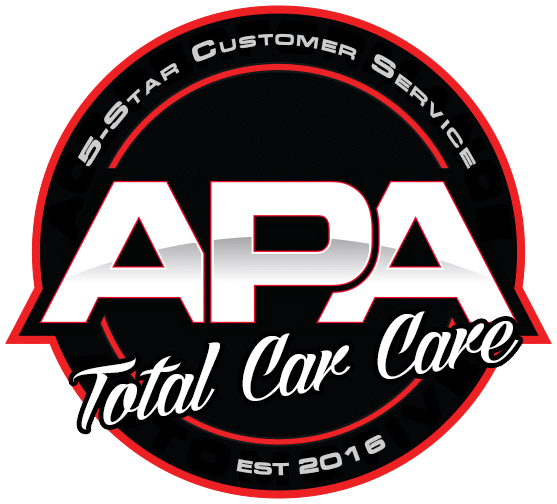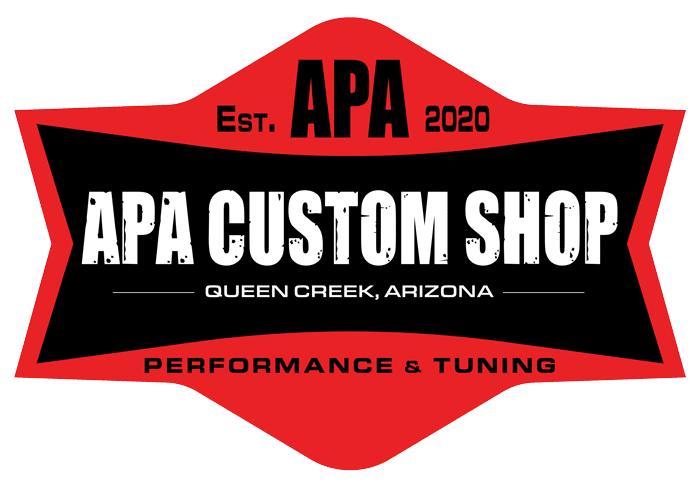When to Replace Your Brakes: Warning Signs Every Queen Creek Driver Should Know
Every Queen Creek driver knows our roads can be unpredictable, from stop-and-go traffic near town centers to long stretches of rural highways where sudden stops aren’t uncommon. Add in the Arizona heat, dust, and occasional construction zones, and your brakes are doing a lot more work than you may realize. If your vehicle starts to hesitate when stopping, makes strange sounds, or just feels “off” under your foot, it could be a sign that brake replacement is needed—often sooner than expected.
At APA Total Car Care, we help Queen Creek drivers recognize these small but important signs of brake trouble before they escalate into more expensive and potentially dangerous repairs. Brake problems often start subtly, so the earlier you catch them, the better. Not sure what to watch for? Let’s break it down.
Brakes 101: What’s Happening When You Stop?

Braking feels simple. You press the pedal, and the car slows down. But behind that action is a complex system of hydraulic force, friction, and responsive hardware.
Most vehicles today use disc brake systems. When you hit the brake pedal, a fluid-filled line compresses the brake caliper, which clamps a set of brake pads against the rotor (the spinning disc attached to your wheel). This friction slows the wheel and your car.
The trouble starts when any part of that system wears out. Brake pads thin out, rotors get grooved or warped, calipers may stick, and brake fluid can degrade over time. When one part begins to fail, the rest often follow. That’s why early detection and regular inspection are key.
The Most Common Signs Your Brakes Need Attention
1. Squealing Sounds
A sharp, high-pitched squeal when braking is typically caused by your brake pad wear indicators. These are designed to alert you that the pads are getting too thin. It’s one of the earliest and easiest signs to catch before damage sets in.
2. Grinding or Scraping
If you hear a grinding sound, your pads may be completely worn, causing the metal backing to contact the rotors. This not only reduces braking ability but can also damage your rotors, leading to more costly repairs.
3. Soft or Spongy Brake Pedal
A brake pedal that feels soft, mushy, or sinks to the floor could indicate air in the brake lines or a fluid leak. Both issues reduce stopping power and need to be addressed promptly to ensure your safety.
4. Car Pulls to One Side When Braking
If your vehicle pulls to the left or right during braking, it may be due to uneven pad wear or a sticking caliper. It’s a common issue, especially in areas like Queen Creek, where dust and uneven roads are factors.
5. Steering Wheel Vibration
Shaking or vibrating in the steering wheel when braking, especially at higher speeds, is usually a sign of warped rotors or poor wheel balance. It affects your control and should be checked by a technician.
6. Brake Warning Light Is On
The brake warning light on your dashboard means the system has detected a problem, such as low fluid, worn pads, or a sensor issue. Even if your brakes feel normal, don’t ignore this important alert.
Driving Habits That Wear Out Your Brakes Faster
This is where it gets interesting. Brakes don’t just tell you when something’s wrong with them; they also reveal how you drive.
If you’re wearing through pads quickly, it might not be a quality issue. It could be a habit issue. Riding your brakes, especially downhill or in heavy traffic, can cause early wear. Sudden stops from high speeds create more heat, which affects pad life and can warp rotors. Even how closely you follow other vehicles influences how often you use your brakes.
In Queen Creek, drivers face a unique combination of stop-and-go intersections, freeway ramps, and open stretches. This kind of varied driving can affect each part of your brake system differently.
Taking stock of your driving habits can help extend the life of your brakes. If you’re not sure what your habits are costing you, a professional brake inspection is the best way to find out.
Schedule your brake inspection now and get clarity before small habits become costly repairs.
Mileage, Wear, and the Right Time to Replace Your Brakes
There’s no single answer for every vehicle, but here’s a general guideline:
- Brake pads: Replace every 30,000 to 70,000 miles, depending on use
- Rotors: Inspect with each brake service. Resurface or replace as needed
- Brake fluid: Flush every 2 years or as recommended by your manufacturer
Of course, this also depends on whether you tow trailers, drive through hilly terrain, or frequently encounter traffic. Drivers in Queen Creek who regularly drive through town and into the Phoenix metro area often see faster brake wear due to constant stop-and-go movement.
What Happens If You Wait Too Long?
Delaying brake repair can lead to:
- Rotor damage: Replacing rotors is more expensive than just pads
- Caliper failure: A stuck or overheated caliper can ruin pads and rotors
- Fluid contamination: Old fluid absorbs moisture and leads to corrosion
- Extended stopping distance: Your safety is compromised when your car doesn’t respond immediately
The longer you wait, the more components need to be replaced. That’s why we recommend brake inspections as part of regular car maintenance.
If you’ve been searching for “car maintenance near me” or wondering when your last brake check was, this is your sign to get one scheduled.
Queen Creek’s Brake Experts: Reliable, Local, Trusted
Brakes are a safety system. They require attention to detail, experience, and high-quality parts, not just fast service.
Here’s why APA Total Car Care in Queen Creek is trusted by drivers throughout the East Valley:
- We prioritize your peace of mind. Through digital inspections, we show you exactly what’s happening with your brakes, so you can approve repairs with full confidence.
- Skilled technicians, complete system care. Our team is ASE-certified and trained to evaluate everything—pads, rotors, brake lines, and fluid—ensuring your entire brake system performs at its best.
- Parts that meet or exceed OEM specs. You get lasting quality and a 2-year/24,000-mile warranty to back it up, giving you both safety and value.
- Independent and community-focused. We’re proudly family-owned, serving Queen Creek drivers with the kind of personal service and transparency that national chains can’t match.
- Service versatility that goes beyond brakes. APA Total Car Care is your local one-stop shop for auto repair, performance upgrades, and custom solutions, because your vehicle deserves more than a quick fix.
Noticing These Signs? It’s Time for a Brake Check
There are key moments when scheduling brake service is the smart move:
- You hear squealing or grinding
- Your car pulls while braking
- The brake light comes on
- You feel vibrations or shuddering
- You’re approaching or just passed 30,000 miles since your last service
- You’re heading out on a road trip or hauling a trailer
Even if everything “feels fine,” scheduling regular inspections is a good habit that prevents surprise repairs later.
Noticing unusual brake behavior? Check out these 5 signs you might need brake service or repair before it becomes a bigger issue.
Frequently Asked Questions (FAQ)
Can the Arizona heat affect my brakes?
Yes. High temperatures in Queen Creek can cause your brake fluid to degrade faster and may contribute to brake fade, especially during long downhill drives or stop-and-go traffic. Regular brake fluid checks are especially important in hot climates like ours.
What’s the difference between ceramic and semi-metallic brake pads?
Ceramic pads are quieter, produce less dust, and offer smoother braking, while semi-metallic pads provide stronger braking power and are often better for heavier vehicles or high-performance driving. Our team can recommend the best option based on your driving needs.
Do I need to replace all four brakes at once?
Not always. Often, front or rear brakes wear out at different rates depending on your vehicle’s design and driving habits. However, we always check all four corners to ensure safe, balanced braking.
How can I make my brakes last longer?
Avoid aggressive braking, don’t ride the brakes downhill, and give yourself space in traffic to coast instead of constantly stopping. Scheduling routine inspections is also key to catching uneven wear early.
Feel the Difference in Every Stop. Book Service in Queen Creek, AZ
Brake problems rarely shout; they whisper. A squeal here, a soft pedal there. But those small signs add up fast, especially on the roads around Queen Creek. At APA Total Car Care, we help you catch issues early with real answers, clear inspections, and repairs done right the first time. Whether you’re navigating local school drop-offs, weekend road trips, or Arizona’s busiest highways, your vehicle should stop when it matters most.
You’ll find us at 22325 S. Scotland Court, Suite 101, Queen Creek, AZ 85142
Have questions? Give us a call at 480-539-6872 or schedule your brake service online. No matter which location you visit, you’ll get the same trusted service, expert diagnostics, and personal care that sets APA Total Car Care apart in the East Valley.

